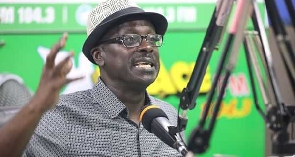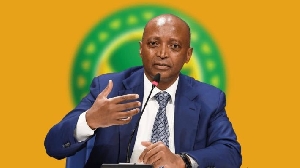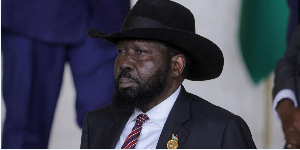US-based Ghanaian lawyer and scholar, Professor Stephen Kwaku Asare, has cautioned the Electoral Commission of Ghana (EC) over its decision to invalidate votes cast for the late presidential candidate of the Ghana Freedom Party (GFP), Akua Donkor, in the upcoming December 7, 2024, presidential elections.
According to Professor Kwaku Asare, widely known as Kwaku Azar, invalidating Akua Donkor’s votes might have serious legal and constitutional consequences because of the country's current electoral laws.
“GOGO urges the EC to approach this matter with caution. Issuing a fiat to declare votes cast for a deceased candidate as 'rejected ballots’ under Regulation 40 of C.I. 127, without amending the law raises serious legal and constitutional concerns. This issue transcends academic interest and strikes at the heart of Ghana’s democratic and electoral framework,” he made these remarks in a post shared on Facebook on November 23, 2024.
He explained that the current law governing elections in the country, C.I. 127, states when a vote cast during a public election can be invalidated, and voting for a deceased presidential candidate is not one of them.
“Regulation 40 of C.I. 127 specifies the conditions under which a ballot may be rejected: lack of an official mark; failure to clearly indicate a choice; marks that could identify the voter; voting for more than one candidate.
“The regulation does not include votes cast for a deceased candidate as grounds for rejection. Declaring such votes as rejected would go beyond the regulation’s scope, necessitating either a statutory amendment to include this scenario or a judicial interpretation to expand the regulation’s application.”
Kwaku Azar pointed out that the EC’s duty is to implement the law and not to make fiat declarations on issues that are not stated in the electoral laws.
He reiterated that C.I. 127 must be amended to make provisions on what to do in the event that a presidential candidate dies.
He added, “Alternatively, the EC could seek judicial clarification to determine how such votes should be treated under the current legal framework.”
The academic added that the handling of the votes cast for Akua Donkor would have an impact on the outcome of the election and, therefore, urged the EC to carefully look at the matter at hand.
“The Constitution mandates that a presidential candidate must secure a majority of valid votes cast to be elected. The treatment of votes for a deceased candidate can significantly impact this requirement. If counted as valid votes, these votes increase the total number of valid votes cast, raising the threshold for achieving a majority. This could disadvantage other candidates as the votes for the deceased candidate become ‘wasted,’ contributing to no living candidate’s tally.
“If declared rejected ballots, these votes are excluded from the total valid votes, lowering the majority threshold. This could alter the dynamics of the election, particularly in a closely contested race, and determine whether a runoff is required,” he wrote.
What EC said:
The EC announced that votes for Madam Akua Donkor's Ghana Freedom Party (GFP) will be counted as rejected ballots during the December 7, 2024, general elections.
The votes for Akua Donkor won't be added to the valid votes cast.
Following the death of Akua Donkor, the EC allowed her political party to present a candidate.
However, her running mate, who filed his forms to contest the election, was disqualified by the EC on grounds of anomalies found in his nomination forms.
However, the commission decided to keep the positions of the political parties on the ballot paper.
Read Kwaku Azar’s full post below:
GOGO commends the Electoral Commission (EC) for its efforts in navigating the unprecedented challenges arising from the unfortunate passing of Akua Donkor. However, GOGO urges the EC to approach this matter with caution. Issuing a fiat to declare votes cast for a deceased candidate as “rejected ballots” under Regulation 40 of C.I. 127, without amending the law, raises serious legal and constitutional concerns. This issue transcends academic interest and strikes at the heart of Ghana’s democratic and electoral framework.
Why This Matters
The Constitution mandates that a presidential candidate must secure a majority of valid votes cast to be elected. The treatment of votes for a deceased candidate can significantly impact this requirement:
If Counted as Valid Votes: These votes increase the total number of valid votes cast, raising the threshold for achieving a majority. This could disadvantage other candidates, as the votes for the deceased candidate become “wasted,” contributing to no living candidate’s tally.
If Declared Rejected Ballots: These votes are excluded from the total valid votes, lowering the majority threshold. This could alter the dynamics of the election, particularly in a closely contested race, and determine whether a runoff is required.
Legal Framework
Regulation 40 of C.I. 127 specifies the conditions under which a ballot may be rejected:
• Lack of an official mark.
• Failure to clearly indicate a choice.
• Marks that could identify the voter.
• Voting for more than one candidate.
The regulation does not include votes cast for a deceased candidate as grounds for rejection. Declaring such votes as rejected would go beyond the regulation’s scope, necessitating either a statutory amendment to include this scenario or a judicial interpretation to expand the regulation’s application.
Authority and Boundaries
The EC’s mandate is to implement existing laws and regulations, not to create new ones by fiat. Issuing a fiat to reject votes for a deceased candidate could be considered ultra vires (beyond its legal authority). It could also invite legal challenges, especially if the decision influences the election’s outcome.
Furthermore, the EC is bound by the Constitution, which protects the right to vote and the sanctity of the electoral process. Declaring these votes rejected could be viewed as disenfranchising voters who may not have had alternative candidates to support. It could also be viewed as undermining the principle of fairness if the decision disproportionately benefits or harms specific candidates.
Article 63(4) of the Constitution outlines the procedure when no candidate secures a majority. Attempting to circumvent this process by reinterpreting the validity of ballots risks eroding public trust and provoking legal disputes.
A Way Forward
Given these constraints, GOGO strongly believes the EC cannot unilaterally issue a fiat to declare votes for a deceased candidate as rejected ballots. Moving forward:
1. The law should be amended to explicitly address scenarios where a candidate dies after ballots are printed but before the election is conducted.
2. Alternatively, the EC could seek judicial clarification to determine how such votes should be treated under the current legal framework.
Conclusion
In Ghana’s legal framework, the EC lacks the authority to unilaterally classify votes for a deceased candidate as rejected under Regulation 40 of C.I. 127. The lesson from the SALL incident, where a similar fiat led to a cardinal sin, must guide future decisions.
Any action that undermines constitutional principles or exceeds the EC’s mandate jeopardizes the integrity of the electoral process. Resolving such issues requires legislative or judicial action to ensure electoral outcomes are fair, transparent, and legally sound. As the saying goes, “Those who fail to learn from history are doomed to repeat it.”
#SALL is the cardinal sin of the 8th Parliament.
BAI/OGB
Watch the latest episode of Everyday People on GhanaWeb TV below:
You can watch today’s compilation of Twi news below:
General News of Sunday, 24 November 2024
Source: www.ghanaweb.com
2024 Election: Declaring Akua Donkor’s votes invalid illegal and unconstitutional - Kwaku Azar explains
Opinions












